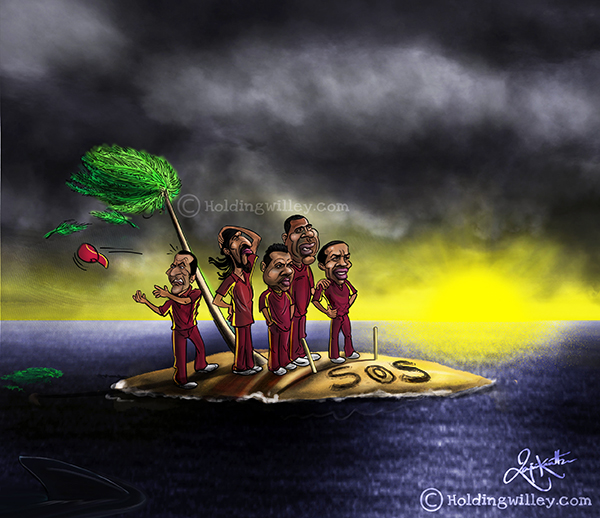 Note: No names have been used to protect the identities of the people involved.
Note: No names have been used to protect the identities of the people involved.
The other day, as I was travelling to my biweekly meeting of Wisden enthusiasts, I came across an interesting man with some fascinating things to say. He was a taxi driver who engaged me in conversation. Naturally, the topic of the ongoing series and the hullabaloo surrounding it came up. At this point, he informed me that everything I knew about the Windies leaving mid-series, especially the pay dispute, was a lie.
He was (and maybe still is) a part-time BCCI-licensed masseur, under a different name (“We all need to earn a little extra, na?”) who gave massages not just to various players, but to several high ranking members of the BCCI and the ICC. Thus, he claimed to know the secret inner workings of the world of cricket. I was sceptical yet fascinated; I had to find out more.
He informed me that the BCCI had in fact paid the West Indian team EXTRA money to abort the series. The BCCI, with the backing of our government, wanted Sri Lanka to play in India all along, and this cancellation was merely a way of getting them here on short notice, with minimal suspicion.
I asked him, why not just call Sri Lanka to begin with, instead of the roundabout, expensive cancellation and substitution of the Windies. It was then that he told me about “The Cricket Wars.”
For years, India, Pakistan, and the rest of the sub-continent have been in a near constant state of conflict. Despite the best efforts of all the governments involved, battles, attacks and other acts of violence continued to occur, and too many lives were lost. The effect was only exacerbated by the involvement of external influences like “America and Russia playing maara-maari in Pakistan-Afghanistan.” To improve the situation, the sub continental countries developed their own secret way of governments dealing with wars: through cricket teams.
As everyone knows, when cricketers toured other countries, they brought with them a small army of staff: trainers, doctors, managers, physiotherapists, all manner of advisors, and even more people who helped the machine that is a cricket team run smoothly. What the governments of India, Pakistan, Sri Lanka, and Bangladesh did was to ensure that every member of the entourage was secretly a government agent of the respective country. While teams were out on the field or otherwise the centre of attention, secret international government negotiations went on behind the scenes. The fate of several countries was decided in the dressing rooms of Eden Gardens, Premadasa stadium, Karachi National Stadium, and the like.
When I pointed out how outlandish this sounded, he replied that in every country, government decisions were always criticised. People did what they wanted and said what they wanted, no matter what efforts the governments made. In addition, governments had to bow to corporate and international pressures. They were not free to act independently. So all these countries had “official” international talks where nothing of consequence happens. The real action took place in saunas and locker rooms.
Getting back to this series, I asked why Sri Lanka was called in particular. He said it was due to the current conflict between India and Pakistan. We could not call over the Pakistani team on such short notice. In the middle of this conflict, it would seem suspicious.
“For a long time, other countries (England being the main representative of Western interests) have suspected we have discussions in secret. They want to know the things that go on. They don’t like these kind of meetings in secret.”
Sri Lanka was coming over to play the middleman. As most teams tour around a lot, the Sri Lankan team would eventually meet the Pakistani team, and have talks with them. To ensure the process is harmonious, we have called the Sri Lankan team next year around as well. Through all the talks, together they will find a way to improve things.
I thought about this, and another question came to mind: what about IPL? Players from all over the world interacted there on the same teams, with staff and entourage from many different countries mixing as well.
He acknowledged that the IPL was a huge problem. Lalit Modi was in fact an undercover agent sent by the English to make sure that the behind the scenes staff got mixed up together, allowing the English agents to infiltrate the ranks, and steal official secrets from other players’ staff. This, in fact, was the main reason Lalit Modi was removed from the operation of the IPL. Once a case was made against him, he was largely out of the picture, but IPL proved popular, and had to be continued. Now it was run by the BCCI, who took time over the years to weed out as many English agents as possible. Modi is free now, so the balance will be upset again. The government will adjust, as governments have to from time to time.
All of this left me rather stunned. As I sat, thinking it all over again, a small detail from earlier on came back to annoy me: There was no fighting, just negotiation and cooperation. So why were they called The Cricket Wars?
He answered, “Oh, that’s only because our cricket teams have a rivalry. Your stop, sir.”